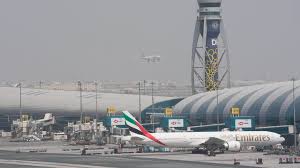Dubai airport flight disruptions in June 2025 have caused significant delays and cancellations due to the temporary closure of airspace over Iran, Iraq, Jordan, and Syria. These closures have impacted operations at both Dubai International Airport (DXB) and Dubai World Central – Al Maktoum International Airport (DWC), affecting thousands of travelers.
Impact on Dubai International Airport (DXB)
Dubai International Airport, one of the busiest airports in the world, experienced significant disruptions as a result of the airspace closures. Flights to and from destinations in Iran, Iraq, Jordan, and Syria were either delayed or canceled. Airlines such as Emirates, flydubai, and Air Arabia were among those affected, leading to a backlog of passengers and increased wait times at the airport.

Operations at Dubai World Central – Al Maktoum International Airport (DWC)
Dubai World Central – Al Maktoum International Airport, primarily serving low-cost carriers and cargo flights, also faced operational challenges. The airspace closures forced airlines to reroute flights, leading to delays and cancellations. While the impact was less severe compared to DXB, passengers traveling through DWC experienced similar disruptions.
Economic and Operational Impacts of Dubai Airport Flight Disruptions
The Dubai airport flight disruptions in June 2025 have had notable economic and operational consequences for both airlines and passengers. With thousands of flights delayed or canceled, airlines incurred significant operational costs, including additional fuel expenses due to rerouted flights and accommodation costs for stranded passengers. Ground services at both DXB and DWC were also stretched, as airport staff worked overtime to manage the sudden surge in passenger inquiries and rebooking requests.
Cargo operations, a vital part of Dubai’s airport ecosystem, were equally affected. Delays in freight movements impacted supply chains, particularly for perishable goods and time-sensitive shipments. Businesses relying on Dubai airports for quick logistics experienced disruptions that required immediate adjustments in their delivery schedules.
Passenger Experience and Challenges
For passengers, the disruptions caused frustration and uncertainty. Families traveling for leisure, business travelers on tight schedules, and international tourists found themselves waiting for extended periods or being forced to change travel plans altogether. Some passengers experienced multiple flight cancellations in a row, requiring them to find alternative travel routes through other hubs in the region. Despite the challenges, airport staff and airlines worked diligently to assist travelers, offering alternative flights, accommodations, and meal vouchers where necessary.
Strategies to Mitigate Future Disruptions
The June 2025 airspace closure highlights the need for contingency planning in the aviation sector. Airlines and airports are increasingly investing in advanced flight monitoring systems and real-time rerouting technologies to minimize the impact of such closures. Dubai airports are also exploring partnerships with neighboring countries to establish alternative flight corridors that could be activated during regional airspace restrictions.
Passengers are advised to remain vigilant and plan ahead for potential airspace disruptions, particularly during periods of regional geopolitical tensions. Staying updated with airline notifications, confirming flight statuses before reaching the airport, and considering flexible travel options can help reduce the impact of unexpected delays.
Airlines Affected by the Airspace Closures
Several major airlines operating out of Dubai were affected by the airspace closures:
- Emirates Airline: Emirates suspended flights to and from Iraq, Iran, Jordan, and Lebanon. The airline advised passengers to check the status of their flights and avoid traveling to the airport without confirmation.
- flydubai: flydubai canceled flights to several destinations, including Iran, Iraq, and Jordan. The airline worked to rebook affected passengers on alternative flights.
- Air Arabia: Air Arabia also suspended services to destinations in the affected regions, leading to cancellations and delays.
Passenger Advice and Support
Passengers scheduled to travel to or from the affected regions were advised to monitor their flight statuses closely. Airlines provided updates through their official websites and customer service channels. Travelers were encouraged to contact their airlines directly for assistance with rebooking and to confirm the status of their flights before heading to the airport.
Conclusion
The Dubai airport flight disruptions in June 2025, caused by the temporary closure of airspace over Iran, Iraq, Jordan, and Syria, highlighted the vulnerability of global air travel to geopolitical tensions. While Dubai’s airports have resumed normal operations, travelers are advised to stay informed about potential future disruptions and to plan their journeys accordingly.
Do follow us: Instagram
Read More: Saudi Health Ministry Urges Parents to Complete First-Grade Fitness Screening



